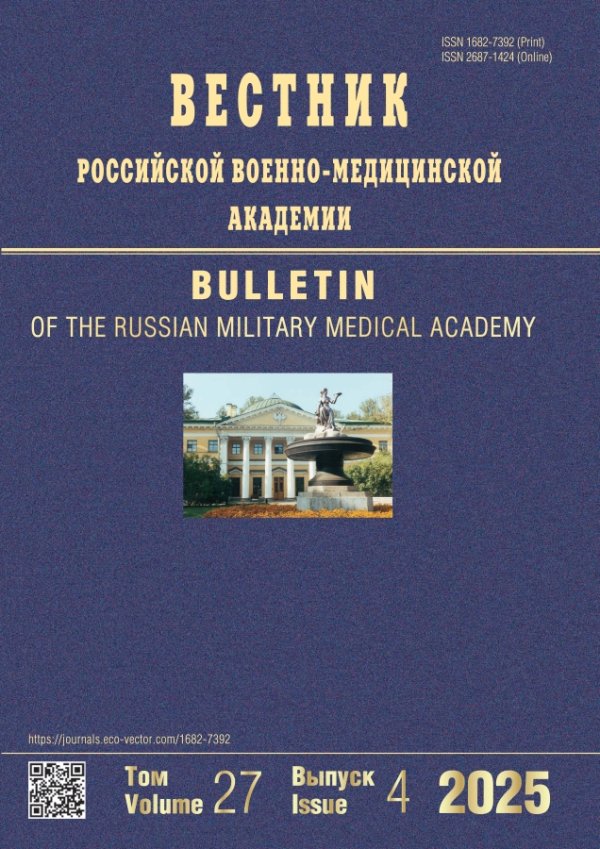Organization and practical seminars on histology and embryology in the remote format using the electronic educational environment of Military medical academy named after S.M. Kirov
- Authors: Lobachev I.V.1, Odintsova I.A.1, Rusakova S.E.1
-
Affiliations:
- Military Medical Academy named after S.M. Kirov of the Ministry of Defense of the Russian Federation
- Issue: Vol 23, No 4 (2021)
- Pages: 281-288
- Section: Education news
- URL: https://journals.rcsi.science/1682-7392/article/view/81419
- DOI: https://doi.org/10.17816/brmma81419
- ID: 81419
Cite item
Abstract
Practical experience of the organization and training at the Department of Histology with a course of embryology in the Military Medical Academy, St. Petersburg in a temporary remote format condition of training related to the pandemic due to a Coronavirus Disease-2019 (COVID-19) is provided. Therefore, educational activity was corrected and methodical work directions and the possibility of program technological support are specified. Necessary educational and reference information was in due time made to the cathedral section of the electronic educational environment of the Academy and multimedia textbooks and manuals are updated and expanded. Separate methodological features of remote classes in histology and embryology are characterized. Of which, one is studying the digitized histologic medicines on the educational presentations without microscopes. For digitization, the sites of medicines, which most reflected the features of the fabric structure of the body, cytovery tectonics details, and histologic structure of morphofunctional units, were chosen. Knowledge control of students was carried out by tests, education, research, and visualized histologic tasks. The problematic issues connected with the remote form of education of future medical officers are revealed. Of which, one is limited opportunities of the electronic educational environment based on the volume of the provided computer information. The role and the place of remote technologies in the educational activity of military medical higher education institutions are defined. The attention for remote format training in medical school is an additional internal classroom occupation that is paid and cannot be fully replaced.
Full Text
##article.viewOnOriginalSite##About the authors
Ivan V. Lobachev
Military Medical Academy named after S.M. Kirov of the Ministry of Defense of the Russian Federation
Email: vmeda_72@mil.ru
SPIN-code: 5867-8312
candidate of pedagogical sciences, associate professor
Russian Federation, Saint PetersburgIrina A. Odintsova
Military Medical Academy named after S.M. Kirov of the Ministry of Defense of the Russian Federation
Email: odintsova-irina@mail.ru
ORCID iD: 0000-0002-0143-7402
SPIN-code: 1523-8394
Scopus Author ID: 6603745712
doctor of medical sciences, professor
Russian Federation, Saint PetersburgSvetlana E. Rusakova
Military Medical Academy named after S.M. Kirov of the Ministry of Defense of the Russian Federation
Author for correspondence.
Email: rusakova-svetik@mail.ru
ORCID iD: 0000-0001-7658-4856
SPIN-code: 5429-4630
Scopus Author ID: 6507529350
сandidate of biology, associate professor
Russian Federation, Saint PetersburgReferences
- Kozlov AV, Lobachev IV, Loginova OB, at al. Technologies of competence-based education in military-medical higher education institution: the monograph. Saint Petersburg: Research Center ART; 2017. 157 p. (In Russ.).
- Odintsovа IA, Rusakova SE. The visualized histologic tasks – an important component of control of knowledge of cadets physicians. The Messenger of Military Education. 2020;(2):64–66. (In Russ.).
- Pavlov AV. Virtual microscopy in teaching histology – new reality of an era of digital technologies. Morphologya. 2019;156(5):75–84. (In Russ.).
- Zhakota DA, Tumanov EL, Korchagina NS. Possibilities of Whole slide imaging technology in medical education. Medical Education and Professional Development. 2019;10(1):55–64. (In Russ.). doi: 10.24411/2220-8453-2019-11006
- Sazonov SV. The digitized tissue specimens in training and working of practical skills and abilities when studying histology in medical school. Bulletin of the Vitebsk State Medical University. 2017;16(4):127–131. (In Russ.).
- Pavlov AV. Virtual microscopy in teaching histology: from the theory to practice. Morphologya. 2018;153(3):211. (In Russ.)
- Meshcheryakov MM. In search of an optimum way. The Messenger of Military Education. 2020;(6):34–39. (In Russ.)
- Zarella MD, Bovman D, Aeffner F, at al. Practical Guide to Whole Slide Imaging: A White Paper From the Digital Pathology Association. Arch Patohol Lab Med. 2019;143(2):222–234.
- Sazonov SV, Odintsovа IA, Erofeyeva LM. Problems of training of research and educational personnel of the top skills on histology, embryology, cytology and teaching this subject matter in medical schools. Morphological Sheets. 2017;25(1):45–48. (In Russ.). doi: 10.20340/mv-mn.17(25).01.10
- Shestakova VG, Kostjunicheva NA, Ganina EB, et al. Kompetentnostnyj i integrirovannyj podhod v prepodavanii morfologicheskih discipline. In: Voprosy morfologii XXI veka. 2018. No. 5. P. 313–314.
- Minchenkov EE. Prakticheskaja didaktika v prepodavanii estestvennonauchnyh disciplin. Moscow: Lan’; 2016. 496 p. (In Russ.).
- Rukovodstvo po gistologii. Danilova RK, editor. Izd. 2-e, dop. i pererab. Saint Petersburg: Spetslit; 2011. Vol. 1. 831 p. Vol. 2. 511 p. (In Russ.).
- Virtual microscopy and digital pathology in training and education. ARMIS. 2012;120(4):305–315.
- Hortsch M. Sharing Virtual Histology Images Worldwide – The Virtual Microscopy Database. J Cytol Histol. 2017;8(5):120.
- Burtseva LP. Technique of vocational education. Moscow: Science; 2015. 160 p. (In Russ.)
Supplementary files













